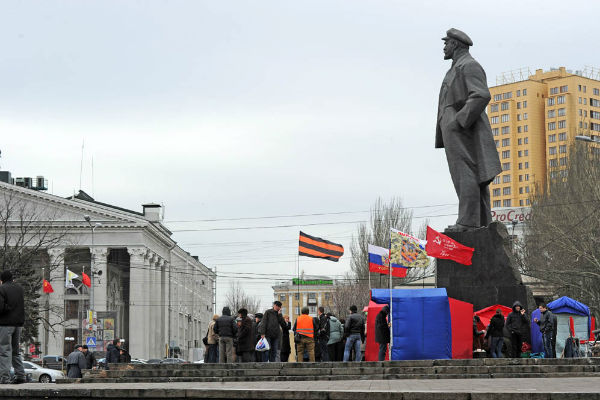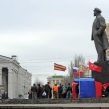
Russian Secessionists Ready for ‘State-Building’ In Ukraine’s Donetsk City
Publication: Eurasia Daily Monitor Volume: 11 Issue: 128
By:

Declared by an unlawful “referendum” on May 11, the Moscow-backed “Donetsk People’s Republic” (DPR; along with the “Luhansk People’s Republic”—LPR) has existed thus far as scattered dots on the map in Ukraine’s east. Initially, those dots included administrative and law-enforcement buildings throughout the Donetsk province. Russian-led forces had seized those key points, enabling the “DPR” to claim control over most of the 18 districts in Donetsk province. Ukrainian forces have regained much of that ground in June and early July. The “DPR” is now reduced to only five districts, which lack full territorial continuity, being themselves interspersed with contested areas (see EDM, July 14).
The “DPR’s” core area has receded to the city of Donetsk, hemmed in by Ukrainian-controlled or contested environs. Secessionist troops (augmented with those that withdrew from other areas) are now concentrated in that city of one million people. There, the “DPR” leaders are now embarking on a state-building project on a city-state scale. It is, alongside the LPR, a building block of the Kremlin’s Novorossiya geopolitical and ideological design. Were it to take root (by Russian commission and Western omission, both patent), the “DPR” would become de facto a city-state inside Ukraine, with a short direct supply line to Russia.
More than a local “pro-Russian” project, this is a Russian project actually. Weapons, instructors, financing, geopolitical agenda, and (for the leadership group at least) ideological motivation are all Russian. And given the “DPR” commander’s repeated complaints that the locals are generally unwilling to join his forces (including most recently in Donetsk—see EDM, July 14), it follows that the pro-Russia forces probably include an even higher proportion of fighters from Russia than hitherto assumed.
On July 10, three top “DPR” leaders appeared at a press conference in Donetsk: “prime minister” Aleksandr Boroday, “defense minister” and commander-in-chief Igor Girkin/Strelkov, and newly appointed “deputy prime minister for security matters” Vladimir Antyufeyev (Interfax-Ukraine, July 10; Russkaya Vesna, July 10).
These leaders have nothing in common with Donetsk or the Donbas. They are citizens of Russia with their origins in Moscow, the Pskov region, and Novosibirsk, respectively. They have arrived in Ukraine on special mission in April 2014, February 2014, and July 2014, respectively.
Boroday is an exponent of Greater-Russia nationalism, long-time contributor to Aleksandr Prokhanov’s “Zavtra” weekly newspaper and “Den TV” Internet channel. These have mutated from a Soviet to a traditionalist-conservative conception of Russian empire. According to Prokhanov, “Boroday is a Russian nationalist, advocate of a powerful Russian state […] he is a confessed nationalist of the White, not the Red imperial idea” (Natsionalnaya Sluzhba Novostey, May 20). Boroday, like Girkin/Strelkov (who also has contributed to Prokhanov’s media outlets) and other proponents of Novorossiya, regard large parts of Ukraine, including Donbas, as rightfully belonging to a Greater Russia or a Russian World. President Vladimir Putin has moved in a similar direction recently.
Girkin/Strelkov introduced himself at that press conference as a Colonel of Russia’s Federal Security Service (FSB), retired from active service as of March 31, 2014. He recounted that he had earlier fought alongside other Russian volunteers in Transnistria and in Bosnia, and then as an FSB officer in Russia’s two Chechen wars (www.62.ua [Donetsk] cited by Ukraiynska Pravda, July 12).
Although defeated in the Sloviansk area, Girkin/Strelkov has emerged with an enhanced reputation among “DPR” leaders and in Russia’s ultranationalist circles. Russian state media and Internet folklore have spun a myth of heroic resistance around Slovyansk. Some of the radical nationalists blame that loss on the Kremlin’s unwillingness to intervene more openly in the conflict. That argument takes its cue from Girkin/Strelkov’s videotaped statements in late June to early July, complaining about insufficient support from Moscow.
Transnistria’s long-serving KGB chief and “state security minister” (1992–2012), Lieutenant-General Vladimir Antyufeyev, has now been appointed as “DPR deputy prime minister,” in charge of “security matters” (“silovyie voprosy”). The “prime minister,” Aleksandr Boroday, picked Antyufeyev in Moscow, where Boroday had rushed for consultations after the defeat of secessionist forces in Slovyansk (Interfax, July 10).
Antyufeyev is a police officer who proved effective at controlling Transnistria’s civilian population and organizing illicit cross-border traffic there. He is apparently expected to transfer that experience to Donetsk. Unlike the “DPR” leaders and their Moscow sponsors, however, Antyufeyev has no record of involvement with the “Novorossiya” or other ideological, pan-Russian, or Eurasian projects. He is a straightforward neo-Soviet KGB practitioner.
According to Antyufeyev at his introductory news conference in Donetsk, he will be in charge of “DPR’s” “state” security agency, internal affairs “ministry,” and courts of justice. In his words, he is “tasked to reconstitute the law enforcement structures in the ‘DPR.’” He introduced himself as having “dedicated my life to the struggle against national-fascism in Latvia and Moldova,” prior to embarking on this new mission (Interfax-Ukraine, Russkaya Vesna, Kommersant-Moldova, July 10).
Latvia forms the less-known chapter of Antyufeyev’s career. He commanded a Soviet OMON (special-assignment police unit) in Riga in 1990–1991, participating in a murderous but ultimately abortive crackdown on the independence movement there, before resurfacing in Transnistria. Antyufeyev tops the list of sanctions declared by the European Union against some Transnistrian leaders since 2004. Those sanctions are as irrelevant as those recently declared by the EU against a batch of Russian secessionists operating in Ukraine’s east (Ukrinform, July 11).
The “DPR” is in no sense a project for local self-rule or self-determination; nor can Boroday’s group in any sense be said to represent the local population. Thanks to Russian military and propaganda support, however, the “DPR” has largely displaced the local Donbas elite associated with the Party of Regions from power. And it has displaced Ukrainian state sovereignty from “DPR”-controlled territory. Russia seeks to implant a statelet under direct control in and around the city of Donetsk. Attempting to legitimize it, President Putin insists that “DPR’s” political leadership—Boroday in this case—be accepted as a negotiating counterpart to the Ukrainian government in the “Contact Group.” This has already taken place (June 23 and 30, July 6) thanks largely to Germany and the Organization for Security and Cooperation in Europe (OSCE) cooperating with Putin. If continued in the existing form, the “Contact Group” process would ratify the “DPR’s” usurpation de facto.




